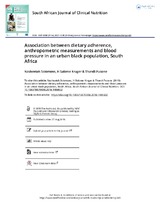Association between dietary adherence, anthropometric measurements and blood pressure in an urban black population, South Africa
Abstract
Objectives: The aim was to determine participants’ dietary adherence by calculating a diet adherence score based on the
Dietary Approaches to Stop Hypertension (DASH)-style diet; (2) to determine if there was an association between dietary
adherence score, anthropometric measurements (waist circumference, body mass index (BMI), waist–hip ratio, waist-toheight-
ratio) and blood pressure (BP) in a South African urban black population.
Design: Cross-sectional secondary analysis of data collected for the PURE study was undertaken.
Setting: Langa, the urban PURE study site in the Western Cape province, South Africa.
Subjects: The PURE study Western Cape urban cohort, 454 participants, aged 32–81 years was utilised.
Outcome measures: Dietary adherence scores were calculated and the BP and anthropometric measurements, respectively, of
participants in the lowest and highest tertiles of dietary adherence scores were compared.
Results: Positive correlations were found between age, for both men and women, and systolic and diastolic BP. A significant
positive correlation between added sugar intake and systolic blood pressure (SBP) was present only in the women. A
significant positive correlation was found between BMI, diastolic BP and SBP in men only. No significant differences existed
between BP of men or women in the lowest and top tertile groups according to dietary adherence score, but a significant
inverse correlation between the dietary adherence score and SBP was found in women.
Conclusions: BMI was positively associated with BP in men, while dietary adherence score was negatively correlated with SBP in
women.
Summary: Non-adherence to dietary guidelines presenting overconsumption of unhealthy foods may be associated with high
blood pressure.

